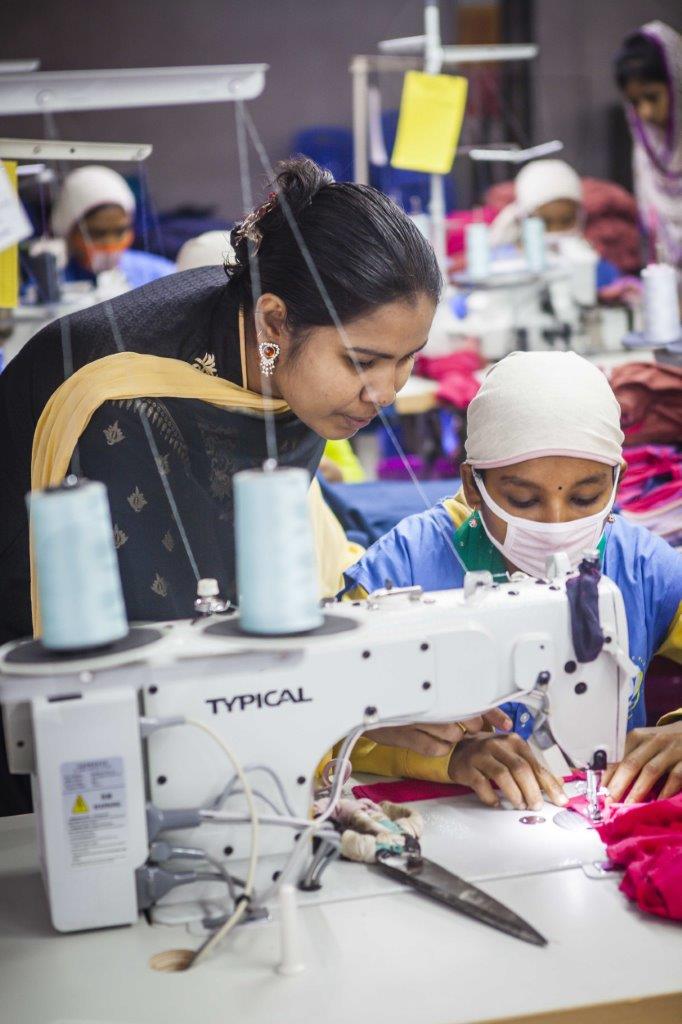with our monthly newsletter.
Garment manufacturers have invested GDP 4.6 million in their unskilled workers.
Palladium has helped create a training model that Bangladesh's garment manufacturers – who produce 84% of the country's exports – want to invest in. Watch the video below.
Bangladesh's garment sector employs four million workers and makes up 11% of the country's GDP and 84% of its exports. But a shortage of skilled workers has contributed to low productivity levels compared to other garment manufacturing countries, such as Cambodia, Turkey, Sri Lanka, and Vietnam.
The lack of skilled workers has been a problem since the sector's inception in the early 1980s, and few effective initiatives have been implemented to remedy the situation. Many business owners haven't seen developing their workers' skills as a worthwhile investment.
But manufacturers are now beginning to understand the need to train their workforce to remain competitive globally, and significant increases in Bangladesh's minimum wage in recent years have provided an additional incentive to upskill staff.
A New Model of Skills Training
Over the past five years, a UK aid and Swiss government funded program has been working with businesses to facilitate skills training that can benefit manufacturers and raise the incomes of a growing labour force, including women, who make up 61% of the sector's workers. The program, called Sudokkho, or 'well skilled' in Bangla, does not pay for the training, but provides expertise to help manufacturers set up in-house training programs.
The Sudokkho team meets with manufacturers to discuss their training needs and to see if they will invest in the training. When the scope of the training is agreed, factory management provides the space and machines for the training and selects supervisors who will receive 'train the trainers' training. Sudokkho experts train these small groups of supervisors, usually factory floor operators, who then begin training entry-level unskilled workers.
The workers acquire skills that are needed by the factor, whether attaching a front pocket or sewing pleats, for example. After 15 to 20 days, these trainees have at least one new competency and can begin working on the factory floor, where they are coached by the trainers for up to three months. Sudokkho's staff revisit the factory regularly to discuss with management how the training is progressing and to check on the performance of the trainees and on the on-going training.

Why the Sudokkho Model
The Sudokkho training model is shorter than other routes to skilling up workers, and as a result it can be cheaper than traditional training models. It also helps workers reach a reliable work-ready standard, which is often not the case with external, non-customised trainings. Seeing how such training helps boost productivity and their bottom line, manufacturers have invested over GBP 4.6 million in setting up and running trainings in their factories.
The model also benefits workers. At the end of March 2019, nearly 14,800 (of the 20,8000) trainees secured new positions and made a cumulative net additional income of GBP 10.17 million. The remaining trainees were existing workers in the factories, so were not included in the job count, but were still able to improve their skills.
These workers are mostly young people, which is particularly important because every year 1.4 million youths enter the labour force in Bangladesh, and youth unemployment is high – 11.6% in 2018. Entering the garment sector offers young people a way to escape poverty, reduces costs for the state, and mitigates the risks associated with a high level of youth unemployment, such as rising crime rates, reduced lifetime employability, and political instability.
Sudokkho is now signing up new brands and manufacturers and embedding a training model that helps women secure more senior supervisor positions on the production line. Crucially, it is building the capacity of local firms so they can continue to offer such training expertise to the industry when the Sudokkho program ends.
Palladium manages the implementation Sudokkho, a skills and employment program funded with UK aid from the British people.
with our monthly newsletter.

